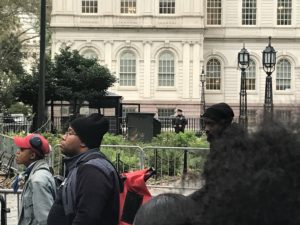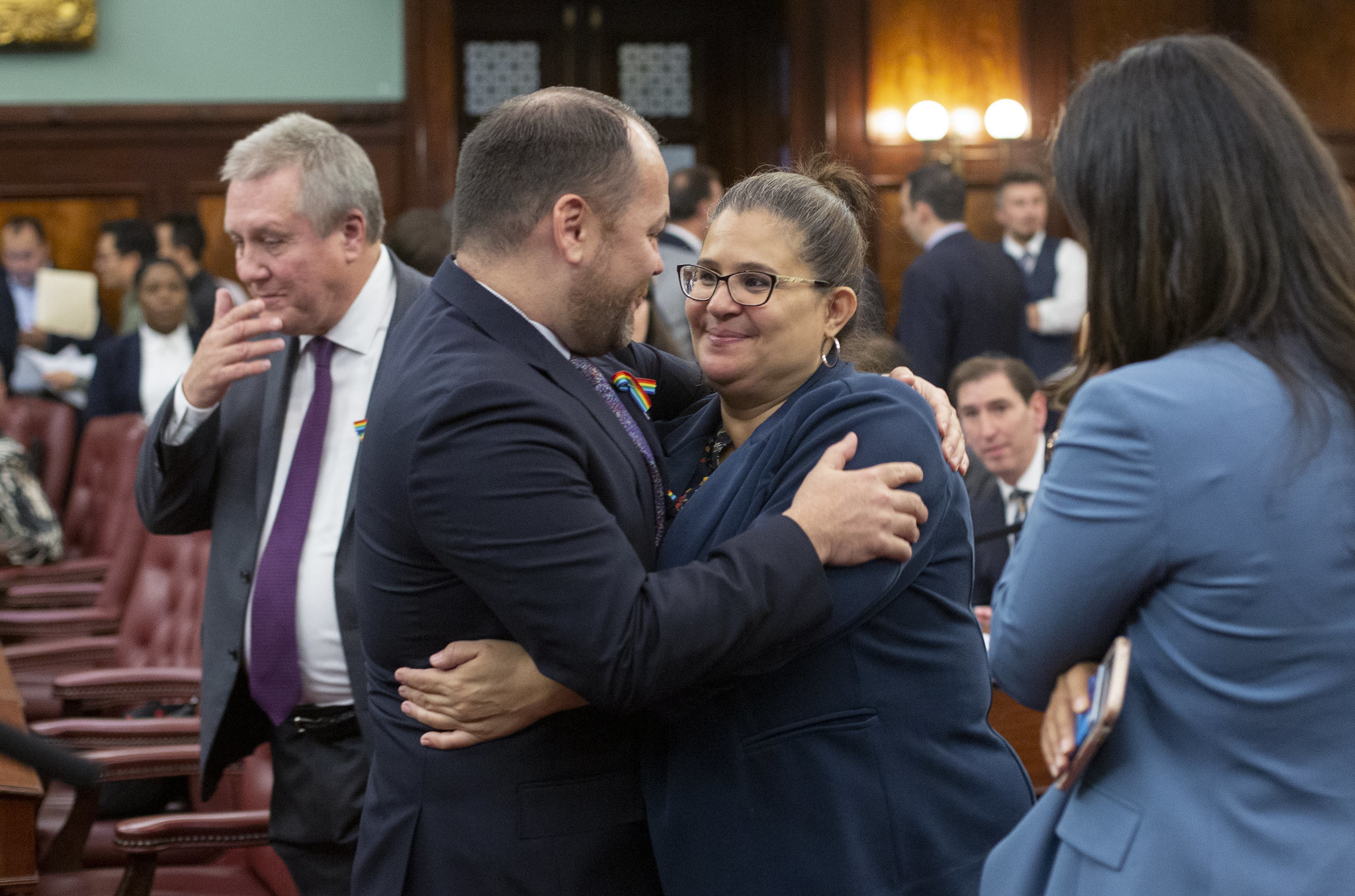On Oct. 17 the City Council voted overwhelmingly to back the de Blasio administration’s historic proposal to replace the jails on Rikers Island with four borough-based jails, but two Bronx lawmakers oppose the part of the plan that calls for the Bronx jail to be built at East 141st Street and Concord Avenue.
Councilmen Rafael Salamanca Jr. and Ruben Diaz Sr. agreed that Rikers must be mothballed quickly, but reminded their Council colleagues that Community Board 1 unanimously rejected the Concord Avenue site where an NYPD tow pound now stands. Members argued at their May meeting that placing a jail in that impoverished residential area could torpedo property values and further destabilize a neighborhood already beset with violent crime the community has fought to alleviate.
Additionally, they say that at 195 feet high and 19 stories, the facility would be completely out of proportion in an area comprised of two-story homes and squat warehouses.
Bronx Borough President Ruben Diaz Jr., Rep. Jose E. Serrano and the City Planning Commission’s Bronx representative Orlando Marin have also taken turns lambasting the idea of building it on Concord Avenue, saying the jail instead belongs next to the E. 161st Street courthouse, on parcels owned by the city and state. City planners contend that those parcels are not big enough.
Criminal justice reform advocates and elected officials have hailed sharp drops in violent crime and in the number of detainees at Rikers as signs that the massive old complex is no longer needed. Experts estimate that the number of people incarcerated will further fall from the current 7,000 to 3,300 by 2027, as the city ratchets up spending on supervised release, from $17 million to $54 million.
Of the four Council members whose districts will get new jails, only Diana Ayala, whose district includes Mott Haven, is up for reelection next year. She has backed city planners’ call for the new jail to be built on the tow pound site since de Blasio announced the idea in 2017.
Ayala personalized her advocacy for closing Rikers, recounting on the Council floor how her younger brother, who suffers from bipolar disorder, was treated brutally while serving time on the island. She is co-sponsoring a bill calling on the Mayor’s Office of Criminal Justice to provide regular updates on the planned Rikers closure, and on the “impact of incarcerated individuals of closing jails on Rikers Island.” That measure is part of $391 million the city is allocating for social programs to “address the root causes of incarceration and help fundamentally reshape New York City’s criminal justice system going forward.”
As they explained their votes, Council members acknowledged the political risk Ayala runs by agreeing on the Mott Haven site despite withering community blowback. Speaker Corey Johnson recognized that “Balancing the needs of your districts and the entire city was not an easy task” for her and the other three Council members whose districts will get new jails.
At a meeting of the Council’s Land Use Committee a day earlier, Salamanca, who chairs that influential committee, voted in favor of closing Rikers, but against provisions to build the new facility in Mott Haven. However, the no vote was purely symbolic, since all four jails were bundled into one Uniform Land Use Review Process (ULURP) application, an unprecedented maneuver that has rankled opponents suspecting that was done to minimize opportunities for critics to tweak specific details in each borough.
“That’s never been done,” shouted Diaz Sr., who represented Mott Haven and Hunts Point in the New York State Senate between 2003 and 2017, at the Council hearing, of the ULURP bundling, and mocking the bill’s backers for not investing more in schools and social programs instead of new jails.
Salamanca contends that the city must shut down the Vernon C. Bain Center, the jail boat that has been moored in the East River in his Hunts Point district since the 1990s, before construction can begin on a new facility.
“The community’s dissatisfaction with the new borough-based plan extend to the broken promises of previous administrations to keep the Vernon C. Bain Correctional Center,” operating, Salamanca said in a press release. “Asking our community to accept a brand new jail without closing the Barge first is wholly unacceptable and disingenuous to Bronxites.”
He also argued that the Mott Haven site is too far from the Bronx criminal court.
“Whereas the city followed the recommendations of the Lippman commission to build borough-based jails at the locations of existing detention centers near county courthouses in three of the four boroughs, the administration cited a location that is more than two and a half miles away from the Bronx courthouse,” he said. “The response from the community and elected officials alike was immediate in their opposition to the location.”
A member of the JustLeadership USA coalition, which supports the mayor’s plan, was delighted with the Council’s yes vote.
“In’07, we missed our shot,” said Harvey Murphy, a lifelong Mott Haven resident who served three years at Rikers on different charges, speaking of a city proposal to build a jail in Hunts Point, before community opposition helped kill it.
Murphy said that the Concord Avenue site is sensible. “The tow pound is the city’s property. Let them use it.”

The No New Jails coalition, which is comprised of numerous grassroots organizations including Take Back the Bronx, organized a rally in City Hall Park on the day of the Council vote, where some 100 protesters gathered, many shouting angrily at lawmakers entering and leaving City Hall throughout the day.
The group released a statement condemning the Council’s vote and vowing to continue fighting it.
“With an opportunity to take a stand against the centuries-old and universally-failed strategy of fixing jails by building jails, the Council failed miserably,” the statement said, accusing “several pro-jail councilmembers”of hypocrisy by invoking Khalif Browder and other detainees who died at Rikers as a ginned-up pretext to build “the tallest skyscraper jails in the world,” and enrich developers.
No New Jails proposes the city divest from the NYPD and use that money to fund Close Rikers Now, We Keep Us Safe, with social programs and educational initiatives.

